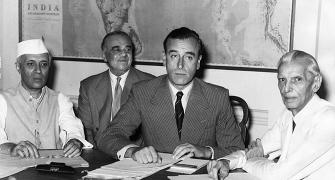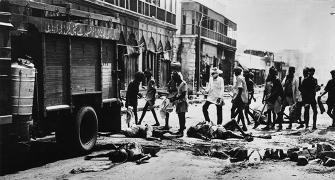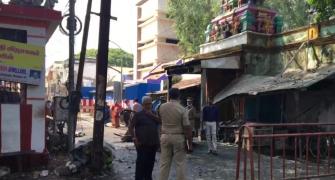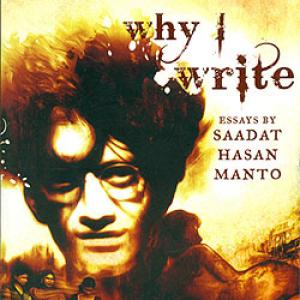'The original dream of people like Faiz was that Pakistan would be something different from the old India: Progressive, forward looking, democratic (if not socialist), tolerant, diverse and pluralistic.'
'I don't think anyone foresaw the catastrophe that Partition was to become.'

It is difficult to explain what Faiz Ahmed Faiz means to the world -- was he a Communist, an atheist, a revolutionary, a poet, a prisoner, a journalist or a humanist?
It is not easy to define Faiz the greatest Urdu poet of the last century. In his 73 years, Faiz wrote some of the most beautiful couplets of Urdu poetry. His angst against the oppressive Pakistani establishment is widely quoted even today.
Faiz's grandson, Dr Ali Madeeh Hashmi has published a biography of his grandfather, Love and Revolution -- Faiz Ahmed Faiz, 32 years after the legendary poet's death in 1984,
Dr Hashmi tells Syed Firdaus Ashraf/Rediff.com why Faiz and his poetry are still relevant. A two part e-mail interview.
What made you think of writing a biography on Faiz Ahmed Faiz? What message do you want to share through this book, Love and Revolution?
Here is a passage from the preface to the book which answers part of this question:
'The idea of writing a biography of my Nana (grandfather) actually materialised gradually over a number of years. He had been a towering (in some ways an overwhelming) presence in our lives. The Zia-ul Haq dictatorship of the 1970s and 1980s was a difficult time for people like my family (liberal, Left-leaning). I remember being teased and taunted in my schoolyard about being the grandson of a 'Communist' and an 'atheist' (and feeling mystified about what that meant!).'
At that time, my main concern was to distance myself from him as much as possible. Years later, living in the US, I could look at his life more objectively. I knew that in spite of all that had been written about him, there had never been a full length biography.
'I had access to close family members and friends as well as his personal papers and books. It also gave me a chance to get into his mind and understand him from the inside out (which, as a psychiatrist, I'm interested in.'
There is no specific 'message' that I want to share with the book. I love writing, he is a fascinating subject to write about and people seem to have an insatiable appetite for all things Faiz.
Other than that, Faiz, of course had a vision, of the way the world ought to be and I have tried to share that.
How difficult was it for you as an author to keep your distance from 'Faiz the human being,' and not get influenced by his personality, since you also happen to be his grandson?
Here is another excerpt from the preface:
'I made a deliberate effort while writing the book to avoid making a family connection and keep myself 'out of the action', so to speak, for several reasons.
I wanted the book judged on its own merit and not as a product of someone related to Faiz. I also wanted to avoid adding to the 'Faiz industry,' where people have turned a brief meeting with him into articles or whole books about him, mainly employing Faiz as a prop to project themselves -- which to me appeared distasteful (although Faiz probably wouldn't have minded).
I wanted to keep the focus where it belonged, on Faiz and his life."
Obviously there is no way to not be influenced by him, especially if you are part of his family, but that's OK. There were a lot of wonderful things about him and the way he lived his life.
The hardest part, probably, now that I know him a lot better than I used to, is trying to live up to his ideals and the way he lived his life.
So much love for humanity, so much forgiveness for those who wronged him, such indifference to all those things that we all long for: Money, power, fame. He was an amazing man.
How far did unrequited love influence Faiz's poetry when he was younger? You mention in the book that he was suffering from the pangs of his unrequited first love with an Afghan girl?
Well, he himself talked and wrote about it. He said that quite a bit of his earlier poetry was influenced by young love and he thought that was a reason it wasn't very good poetry since it did not include a love of humanity, just, call it selfish, kind of love that we all know about. He did not save much of that poetry since he did not think it was very good.
The turning point was, of course, his poem: Mujh se pehli si muhabbat mere mehboob na maang (Don't expect me to love you like I did before) where he acknowledged that love for a beloved was inferior to love for humanity as a whole.
Faiz and Allama Iqbal shared the same teacher, but why did Faiz, younger than Iqbal by 34 years, never get influenced by Iqbal's pan-Islamic political philosophy?
Mainly I think because by the time Faiz came of age, socialist ideas had begun to take hold all over the world, including in (undivided) India.
Faiz started his first job as a lecturer in Amritsar in 1935. Soon thereafter, the All India Progressive Writers Association was formed, influenced by socialist ideals. Faiz was also a sympathiser of the Communist Party of India (although he was never a formal member) and he had already started his trade union activities in Amritsar under the influence of his mentors Dr Rashid Jahan and Sahibzada Mahmuduzzafar and later Syed Sajjad Zaheer, the main force behind the formation of the AIPWA.
Faiz's family of origin was religiously devout, but starting with his years in college in Lahore, his associations were with people who were not overtly religious and once he discovered Communist ideology, there was no question of him reverting to a philosophy like pan-Islamism. He was quite sceptical of the whole idea in fact.
I have a personal memory of him explaining an Iqbal poem to me (I don't remember which one) and making a humorously sarcastic comment about pan-Islamism.
I think he was from a generation that had moved beyond the idea of a 'Muslim' nation (even a global one) to the concept of pan-humanity (if you want to call it that).
He understood that social and political conflict arose from class and economic differences and that there ought to be unity, and it should be among those who are oppressed, no matter which religion, nationality, ethnicity or language.
At what age did Faiz get influenced by Communist ideology? Why did he never get influenced by Islamic ideology even though he was living in Pakistan, a Muslim country?
He was in his twenties and working at his first job as a lecturer in English at MAO College Amritsar when he was introduced to Communist ideas. In his own words: 'One day, (Sahibzada Mahmooduzzafar) handed me a small book and said read this and next week, we will discuss it but it has been banned by the government so be careful. The book was (Karl Marx and Friedrich Engels') The Communist Manifesto and I read it in one sitting, in fact I read it two or three times.'
'Man and nature, the individual and society, society and classes, classes and the means of production, the means of production and the relations of production, the evolution of society, the many layers of human relations, values, beliefs, thoughts and actions, it felt as if someone had handed me the key to a treasure of the unknown. Thus I became interested in socialism and Marxism. Later I read the works of Lenin and felt a great longing to see the land of Lenin and the October Revolution.'
As far as 'Islamic ideology', he was a scholar of Arabic so he had a very deep understanding of Islam and religion but he was drawn more towards the Sufi version of Islam. You need to read the book, it's all in there.
 Faiz wrote that more profound the pain for a poet, the greater will be his art. If that were the case, why don't we see great poets like Faiz coming out of Pakistan in today's time, when life surely doesn't seem easy?
Faiz wrote that more profound the pain for a poet, the greater will be his art. If that were the case, why don't we see great poets like Faiz coming out of Pakistan in today's time, when life surely doesn't seem easy?
I don't think it is as simple as that. While it is true that a poet (or writer or any kind of artist) feels more deeply than the average person, he or she is still ultimately a product of their times, their era, what Marx would have called 'their material conditions'.
Yes, there is a lot going on in Pakistan (and India and around the world) which should make an artist feel angry, infuriated, hurt and many other things; all progressive, forward looking feeling and desire to change things is being swept along in the mad rush of commercialism.
Leftist, socialist ideology has been in decline for over 25 years now since the fall of the Soviet Union and while there have been efforts (in Latin America, for example) to resurrect socialist thinking, they have, by and large been confined to specific regions and have ultimately been subservient to larger, global trends.
I think the momentum is building though for a worldwide eruption of class struggle and change. Faiz was born and raised in the ferment of the great depression, the struggle against the British Raj, the second World War and many other events which shaped his life.
Of course he was enormously gifted at birth, but like he himself said, nothing is possible without 'sweat and hard work' and we just have not seen that combination of qualities in anyone who can claim his mantle yet.
Why did Faiz join the British Army in 1942 and boycott Mahatma Gandhi's Quit India call? Why wasn't he inspired by the Quit India movement?
Faiz was not a member of the CPI, but he was certainly a sympathiser. The Independence struggle and then the demand for Pakistan posed some difficult questions for the party.
Initially, at the outbreak of World War II, the CPI declared it an inter-imperialist conflict and refused to support it. Then, when Nazi Germany violated their pact and attacked the Soviet Union, the CPI declared that the war was now a war against aggression and should be supported.
At the same time, the Imperial Japanese Army was advancing upon India and while some like Subhas Chandra Bose decided that an alliance with the Japanese was a reasonable strategy against Britain, Faiz understood that the Japanese imperialists were no better than the British and fiercely opposed this stance.
When the CPI declared their support for the War against Nazi Germany, that was when Faiz joined the army. Not only was he not inspired by Gandhi's Quit India movement, he considered it a betrayal of the struggle of Indian workers and peasants as he wrote in his poem Ek siyasi leader knaam.
In the book you mention in passing (on page 133) that the CPI threw its weight behind the demand for Pakistan, terming it a matter of national self-determination. Did Faiz support Partition which divided the Indian subcontinent on religious lines?
There is no record of Faiz expressing an opinion on whether Partition was 'right' or 'wrong'. The CPI went through some contortions on this issue, at first opposing the demand for Pakistan and later supporting it on the basis of 'national self-determination'.
Faiz agreed with the party's stance. It was the demand of the Muslim majority and it had to be respected.
I don't think anyone (including Nehru, Jinnah or any other Congress or Muslim League leader) foresaw the catastrophe that Partition was to become, the loss of life, the destruction and the enduring animosity between India and Pakistan.
Faiz was devastated by the riots, the killings and the wanton massacres at the time of Partition and all his life, he made it a point to try and reconcile the two countries he loved the most.
The original dream of the party and people like Faiz was that the new State of Pakistan would be something different from the old India: Progressive, forward looking, democratic (if not socialist), tolerant, diverse and pluralistic; where the rights of workers, peasants, women and the poor would be safeguarded and which would exist in peace with its neighbors including India.
Unfortunately, the reality, for a number of reasons that are mentioned in the book, turned out differently.
Faiz joined Pakistan Times as editor even before Pakistan had come into existence. Did he then always believe in the concept of Pakistan and Parition?
The Pakistan Times was formed in early 1947 when the demand for Pakistan was well advanced and Faiz was invited to become its chief editor by his old friend Mian Iftikharuddin. He had, by then, decided to leave the army (for a number of reasons mentioned in the book) and so was glad to have this new opportunity.
He worked hard at making the Pakistan Times a respected and widely read paper which (along with its sister Urdu publications Imroze and Lail o Nahar) spoke for those who had no voice in society: Workers, peasants, women, minorities etc.
He did this for four years until the government of Pakistan decided that they had had enough and arrested him in the Rawalpindi Conspiracy Case and took over the paper to turn it into a mouthpiece for the government.
Did Faiz really participate in a meeting with Pakistan army chief Akbar Khan in 1951 where it was decided that they would liberate Kashmir from India after overthrowing Prime Minister Liaquat Ali Khan?
Yes, the meeting happened, but the agenda was not really Kashmir's liberation etc, but rather a desire to right what the participants saw was the wrong course Pakistan was taking by establishing military pacts with the US etc. The participants wanted a change of government, specifically of a 'Left' variety.
I think it's important to understand this episode of Pakistan's history because in a way it was a turning point, which is why I have devoted two full chapters to it in the book.









